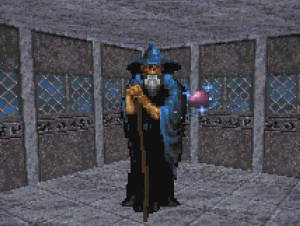Saturday 6 October 2001

|
Pic of the day: Daggerfall is an example of a magic fantasy world that is not entirely medieval. There is a good banking system, for instance, and reasonably good communications. Most towns and some villages have their own Mages Guild, which dispense useful services to the populace. So do temples, which are plentiful. Still, it's not quite up to modern standards ... Advanced magic worldsI've noticed that when we write magic fantasy books or short stories, it is easy to default to the medieval background, and a few magicians and kings and nobles that live extraordinary lives. The rest are just peasants and craftsmen and the occasional trader, or they are Adventurers and inherently special. But why can't a magic world have a standard of living similar to ours? Why can't it be full of wonders, like our world is? ***Technology is an inherently iterative process. We use tools to create more tools, and occasionally to create better tools. At one point in history, what we in our timeline call the "industrial revolution", we started to use machines to make things rather than craft them by hand. It started with textiles, but soon mass production became the rule. There are many magic systems that would allow a similar breakthrough. Basically you need a good science of enchantment. You could have, for instance, a wand of lesser transformation, transforming leather into shoes. This would be hard coded into the wand, so only a source of magical energy is needed. Some worlds have magic stones or magic wood, which could be mined or grown to power the transformations. An intriguing option is the one found in GURPS, the role playing system. Here, magic spells are powered by draining the strength of the caster. In the case of magic items, that means the wielder. So you could line up unskilled labor and have them use a wand of transformation, then passing it to the next in line while they go to rest for an hour or two. Basically, this would increase the value of unskilled labor a lot. Imagine a strong guy with no skills except eating, being able to produce consumer goods faster than an expert craftsman. Now that would certainly make for an interesting society. ***On the other extreme, how about a society of mages? After all, one would expect magic to confer a strong evolutionary advantage. So why haven't mages bred the mundanes out of existence long ago? In common fantasy worlds, this seems to be solved by having all the mages be dorks who have little interest in human company, much less sex. But imagine that in some worlds, there is a mutant some time in the past ... a good looking, horny mage! If this happens long ago, say at the end of the ice age, mundanes would probably go the way of the neanderthals. If it happened more recently, say 2000 years ago, there may be enclaves of mages, and other mages scattered around the world as a ruling class. The resentment among mundanes might lead the less adventurous mages to prefer living among their own, in special cities or homelands. So how would life be in a mage society? I imagine that they would use magic to obtain a standard of living similar to ours, or above. Mages would not use sooty lanterns; they would cast a light spell as easily as we flick a switch. That is, once they have the training. They would levitate to their office on the 12th floor. They would use magic to prepare food, magic to heat water for their bath, and so on and on. Much like we depend on electricity, they would depend on magic. But a society of personal spellcasters would require a lot of training just for personal everyday skills, not to mention a magic career. Childhood would grow longer - most people might not have all the "survival skills" to move out until the age of 30 or more! This would create a strong evolutionary pressure toward intelligence and longevity. Intelligence because the sooner and the better you learn all your spells, the faster you can move out and start your own family. And longevity, because if you are 30 when you have your first child, and then that child needs you for 30 more years, you won't have many successful children unless you stay healthy for a long long time. Intriguingly, this is the same trend that we see in our own society, only more so. Isn't that convenient? A story about such a world could be used to illustrate trends in our own society, and shed light on where we are going. And isn't that the point of fantasy? To see what we are and what we could be ... |
Some sun today. |
Yesterday <-- This month --> Tomorrow?
One year ago
Two years ago